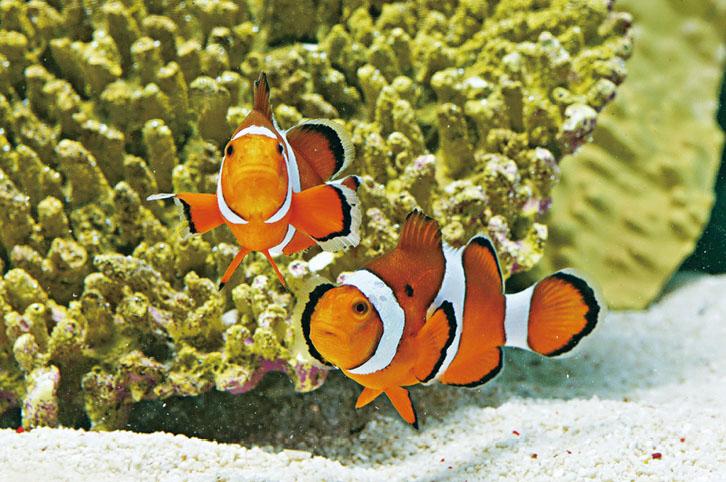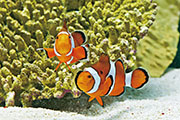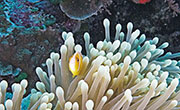Animal:Clownfish – a jolly good neighbour
【明報專訊】As neighbours, the clownfish are cheerful-looking and extremely helpful. No wonder they are on such good terms with their hosts – the sea anemones.
Found in the shallow waters of the Indian Ocean, the Red Sea and the western Pacific Ocean, clownfish make their homes among anemones (海葵) in sheltered reefs. They have brightly-coloured bodies in orange, red and yellow, with black and white stripes, like a clown's face paint.
Amazing partnership
Did you know that these harmless-looking anemones have a fatal sting that can kill fish for prey? Not the clownfish though. They can produce a special mucous (黏膜) around their body which shields them from the stinging cells of the particular anemone they are staying with. When clownfish pick their host, they perform a dance with the anemone, gently touching the anemone's tentacles with different parts of their body. In this way, they adapt to the host and are safe with the stinging cells. Once the clownfish have chosen their host, they rarely leave, except for short trips to seek floating plankton (浮游生物) for food.
The clownfish find protection by living in the anemone. In return, the clownfish offer a range of services to the anemone: they remove parasites and chase away predators of their host. The bright colours of clownfish help attract other fish to come close and become the anemone's prey. Their faeces also fertilise the anemone.
Different animal species being of service to each other is called a symbiotic relationship (共生關係). It is often found in nature, where animals and plants thrive side by side.
Fluid gender
The clownfish are awesome in more than one way. They can also change sex! All clownfish are born as males. As they become older, they join small groups of clownfish living together in an anemone. The largest in the group is always female. She mates with the largest male in the group to form a breeding pair. Should anything happen to the female, the largest male will change sex to become the dominant female.
The adorable clownfish nest in coral reefs which are in serious danger around the world. Corals are under various threats including rising water temperature, destructive fishing practices, coastal development and pollution. The future of clownfish and their habitats are interconnected to our individual action to conserve nature. We can help by choosing sustainable seafood and adopt a low-carbon lifestyle.
Text and photos: Ocean Park Hong Kong
[Smarties' Power English 第286期]







